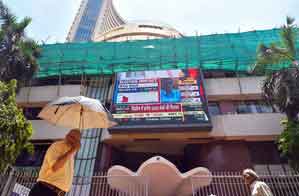Even as tensions between India and Pakistan rise once again following the barbaric Pahalgam terror attack, Indian stock markets have showcased resilience every time the two neighbouring nations went into conflict.
While investors may have initially turned cautious, historical trends reveal that Indian markets have consistently overcome geopolitical challenges and emerged even stronger.
Whenever tensions flared along the Line of Control (LoC), the Indian stock markets saw brief declines but soon staged strong recoveries -- reflecting the underlying strength and confidence in India's economic growth.
Take the example of the Balakot airstrike. After the Pulwama terror attack, when the Indian Air Force carried out successful airstrikes on terror camps in Balakot on February 26, 2019, the Sensex fell by 239 points and the Nifty by 44 points.
However, the very next day, the Sensex rebounded, opening 165 points higher and closing flat -- showing a swift recovery.
Similarly, after the Pulwama attack on February 14, 2019, markets showed only a minor reaction, with just a 0.2 per cent fall the following day -- highlighting investors' long-term confidence in India's stability.
During the Uri surgical strikes, while there was a sharper fall, with the Sensex slipping about 400 points and the Nifty around 156 points, the markets quickly regained strength in the following sessions -- maintaining a strong growth trajectory.
Even during the 26/11 Mumbai terror attacks in 2008, the markets defied global expectations. Instead of falling, the Sensex surged by nearly 400 points and the Nifty gained around 100 points during that period.
The 1999 Kargil war was another shining example of India's economic resilience. Despite the conflict lasting nearly three months, the Sensex soared by over 1,100 points and the Nifty jumped more than 300 points, registering gains of about 33 per cent during the period.
Historical data clearly shows that while short-term volatility occurs during geopolitical tensions, Indian stock markets have not only recovered but thrived over the long term.
During the intra-day trade on Monday, Sensex had climbed nearly 1,000 points, or 1.3 per cent, while the Nifty rose about 300 points, or 1.23 per cent, to trade at 24,329 -- reflecting the market’s steady confidence despite geopolitical concerns.






Indian stock market opens in red as Israel-Iran tensions rise
The Indian benchmark indices opened sharply lower on Friday as tensions escalated between Israel and Iran. Heaving selling was seen in the auto, IT, Financial service and PSU Bank sectors in the early trade.
Stock market ends in green, Bank Nifty hits new all-time high of 57,000
The Indian stock markets closed in the green on the first trading day of the week, as Bank Nifty hit a new all-time high of 57,000 on Monday, reflecting strong sentiment and momentum in the banking sector.
World’s largest container ship MSC IRINA arrives at Adani’s Vizhinjam International Seaport
In a historic feat, the world’s largest container ship MSC IRINA arrived at Adani Group's Vizhinjam International Seaport on Monday, which will be berthed till Tuesday.
Indian stock market opens in green, IT and PSU banks lead
The Indian benchmark indices opened higher on Monday amid positive global cues, as buying was seen in the IT, PSU banks and auto sectors in the early trade.
India now has 1.76 lakh registered startups, 118 unicorns: FM Sitharaman
The number of registered startups has reached 1.76 lakh in the last 11 years, with 118 unicorns (startups with $1 billion valuation and above), thus fueling youth entrepreneurship, Finance Minister Nirmala Sitharaman said on Friday.
Adani Ports secures Rs 5,000 crore via 15-year non convertible debenture
Adani Ports and Special Economic Zone Ltd (APSEZ) on Friday said it has successfully raised Rs 5,000 crore through a 15-year Non-Convertible Debenture (NCD).
Indian stock market ends in green over positive global cues
The Indian stock market closed in green on Thursday amid positive global cues. Sensex closed 320.70 points or 0.39 per cent up at 81,633.02 while Nifty ended up 81.15 points or 0.33 per cent at 24,833.60.
Total telephone subscribers in India increase to 1,203.84 million in April
The number of total telephone subscribers in India increased from 1,200.80 million at the end of March to 1,203.84 million in April, a monthly growth rate of 0.25 per cent, the government’s telecom subscription data showed on Thursday.